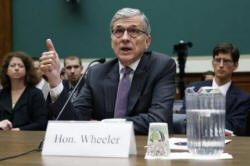|
 FCC
looking into slow Internet download speeds FCC
looking into slow Internet download speeds
 Send a link to a friend
Send a link to a friend
[June 14, 2014]
By Alina Selyukh and Marina Lopes
WASHINGTON (Reuters) -
U.S. regulators will review agreements between Netflix,
Verizon, Comcast and other content and Internet
providers to figure out whether they are causing slow
web download speeds for some consumers, especially for
streaming video content.
|
|
 Consumers have complained to the Federal Communications Commission
about the ongoing spat between Netflix and Internet service
providers (ISPs). Both sides accuse each other of causing a slowdown
in Internet speeds by the way they route traffic. Consumers have complained to the Federal Communications Commission
about the ongoing spat between Netflix and Internet service
providers (ISPs). Both sides accuse each other of causing a slowdown
in Internet speeds by the way they route traffic.
"At the heart of this is whether ISPs that provide connectivity in
the final mile to the home can advantage or disadvantage content
providers, and therefore advantage or disadvantage consumers," FCC
Chairman Tom Wheeler said on Friday.
Large content providers such as Netflix Inc <NFLX.O> have
historically paid middlemen or ISPs to deliver their content to
consumers. The specifics of such agreements, known as
"interconnection" and sometimes "peering," have been secret and
outside of the FCC's regulatory scope.
The FCC earlier this year launched a new effort to set rules
regulating how broadband providers manage Internet traffic on their
networks. Netflix has urged the agency to begin regulating such
agreements to do away with fees that content companies pay.

Though the FCC has not indicated that it plans to regulate the
deals, the agency is now asking multiple Internet service providers
and content companies, particularly video service providers, to
provide details, Wheeler said.
"Consumers need to understand what is occurring when the Internet
service they’ve paid for does not adequately deliver the content
they desire, especially content they’ve also paid for," he told
reporters after a monthly FCC meeting.
"What we are doing right now is collecting information, not
regulating. We are looking under the hood. Consumers want
transparency. They want answers. And so do I," he said.
In an earlier statement Wheeler said the commission is "not
suggesting that any company is at fault."
Consumer advocates, who support stricter regulatory oversight of
relationships between content and Internet providers, welcomed the
step and called on the FCC to make details of those agreements
public.
It is unclear whether the FCC plans to do so.
Analysts pegged the FCC's move as a win for Netflix, which on Friday
welcomed the move toward more transparency.
"Americans deserve to get the speed and quality of Internet access
they pay for," Netflix spokesman Joris Evers said in a statement.
[to top of second column] |

Netflix earlier this year agreed to pay fees to Verizon
Communications <VZ.N> and Comcast <CMCSA.O> to bypass middlemen and
deliver content directly to the companies' subscribers, ensuring
faster speeds.
"Netflix has been paying (for traffic delivery) since inception. It
wants free, I get it, but someone has to pay for it," Jim Cicconi,
AT&T Inc <T.N> senior executive vice president for external and
legislative affairs, said earlier this week.
Netflix streaming accounts for nearly one-third of North American
web traffic during peak times, according to research by Sandvine
Corp.
Netflix vice president for global public policy, Christopher
Libertelli, this week said the company already invests money in
delivering traffic to the Internet provider.
"We pay a lot of money to drop content at the doorstep of an ISP.
All we're really asking is for the ISPs to swing the door open,"
Libertelli said at the Aspen Institute think tank. "This has become
a new choke point."
The FCC has regulated "net neutrality" only on the part of the
network that goes from the Internet service providers to the
consumer, and has not delved into what happens before that. The
agency's proposed net neutrality rules keep that distinction.
Comcast, Verizon and AT&T welcomed the FCC's review on Friday.
Internet providers pointed out that traffic exchange fees have long
been negotiated through commercial agreements and said they hoped
the review would focus on consumers and not a particular business
model.
(Reporting By Marina Lopes and Alina Selykh in Washington and Lisa
Richwine in Los Angeles; Editing by Ros Krasny and Chris Reese)
[© 2014 Thomson Reuters. All rights
reserved.] Copyright
2014 Reuters. All rights reserved. This material may not be
published, broadcast, rewritten or redistributed.

 |